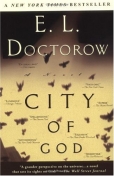BKMT READING GUIDES
City of God
by E. L. Doctorow
Paperback : 288 pages
0 club reading this now
0 members have read this book
Introduction
(With brilliant and audacious strokes, the author of Ragtime and Billy Bathgate creates a breathtaking collage of memories, events, visions, and provocative thought, all centered on the idea of a modern reality of God. At the heart of this stylistically daring and dazzling inventive tour-de-force is a riveting detective story about a cross that vanishes from a Lower-East-Side church, only to reappear on the roof of an Upper-West-Side synagogue. Intrigued by the mystery-and by the Episcopal priest and female rabbi who investigate the strange desecration-is a well-known novelist whose capacious brain is a virtual repository for the ideas and disasters of the age.
Employing a multi-voiced narrative that perfectly captures the riffs and rhythms of latter-day New York, then broadens to implicate a cast of characters including scientists, war veterans, prelates, Holocaust survivors, cabinet members, theologians, filmmakers, and crooners, City of God is E. L. Doctorow's most ambitious and intensely personal work. Vast in scope, biblical in tone, it is a monumental work of spiritual reflection, philosophy, and history by America's preeminent novelist and chronicler of our time.
You want ambition? E.L. Doctorow's City of God starts off not merely with a bang but with the big bang itself, that "great expansive flowering, a silent flash into being in a second or two of the entire outrushing universe." It doesn't, to be sure, remain on this cosmic plane throughout. There's a mystery here, along with a romance, a chilling Holocaust narrative, and a deep-focus portrait of fin-de-siècle Manhattan--not to mention cameo appearances by that Holy Trinity of contemporary mythmaking: Albert Einstein, Ludwig Wittgenstein, and Frank Sinatra. But while the author of Ragtime and Billy Bathgate is no slacker when it comes to entertainment, he has more in mind this time around. Even the title, with its Augustinian overtones, tips us off to the author's preoccupation with belief, human consciousness, and "our wrecked romance with God."
Let's return, however, to that mystery. In the early pages of the novel, an enormous brass cross is pilfered from a church on the Lower East Side. Father Thomas Pemberton of St. Timothy's promptly sets off in search of it, dubbing himself the Divinity Detective. Yet he suspects from the start that this is no ordinary theft, with no ordinary solution:
So now these people, whoever they are, have lifted our cross. It bothered me at first. But now I'm beginning to see it differently. That whoever stole the cross had to do it. And wouldn't that be blessed? Christ going where He is needed?Where He seems to be needed is the opposite side of the ecumenical aisle. The cross turns up on the roof of the Synagogue for Evolutionary Judaism, a tiny Manhattan institution to which Pemberton has clearly been led by fate. His encounter with the synagogue's rabbinical duo--a husband-and-wife team struggling to reclaim a pre-scriptural state of "unmediated awe"--transforms his life. It also destroys what's left of his conventional Christian belief. Augustine's spin on original sin, for example, now strikes him as "a nifty little act of deconstruction--passing it on to the children, like HIV." And as his relationship with Judaism deepens, he discards the clerical collar altogether and embarks upon a penitential exploration of the Holocaust--which in turn allows Doctorow to loop his narrative back and forth between several generations of (mostly) Jew and Gentile.
Astonishingly enough, the foregoing only scratches the surface of City of God. This marvelous hybrid also includes a metafictional framework (i.e., an author-as-character with a rather Doctorovian resume), an ongoing rumination on city life, and a dozen other major strands and minor players. There are, not surprisingly, a number of misfires. For example, Doctorow has long been interested in the power of American popular song--in the way that, say, Gershwin's work has come to function as a kind of secular hymnal. Yet the author's postmodernist variations on the standards, which appear at regular intervals throughout the novel under the ominous rubric of "The Midrash Jazz Quartet Plays the Standards," are jaw-droppingly awful. One might also argue that the book is too centrifugal, too devoted to the storytelling principle of the big bang. Still, there is an undeniable power to the way Doctorow makes his fictional worlds collide, setting off all manner of historical and philosophical conflagrations. At one point he imagines "the totality of intimate human narrations / composing a hymn to enlightenment / if that were possible." A tall order, yes. But despite its occasional longueurs, City of God suggests that it's possible indeed. --James Marcus
Discussion Questions
No discussion questions at this time.Book Club Recommendations
Recommended to book clubs by 0 of 0 members.
Book Club HQ to over 90,000+ book clubs and ready to welcome yours.
Get free weekly updates on top club picks, book giveaways, author events and more








